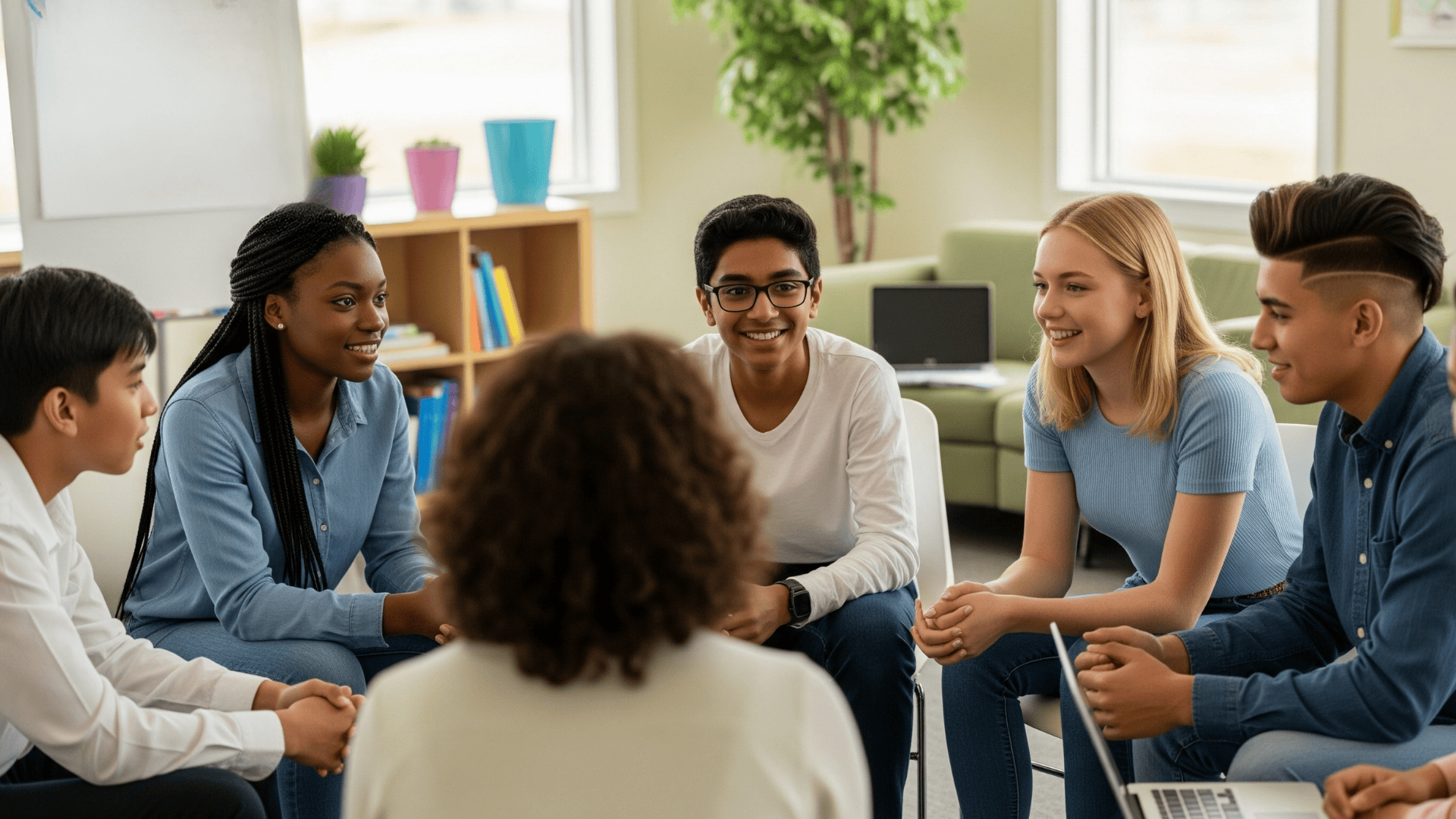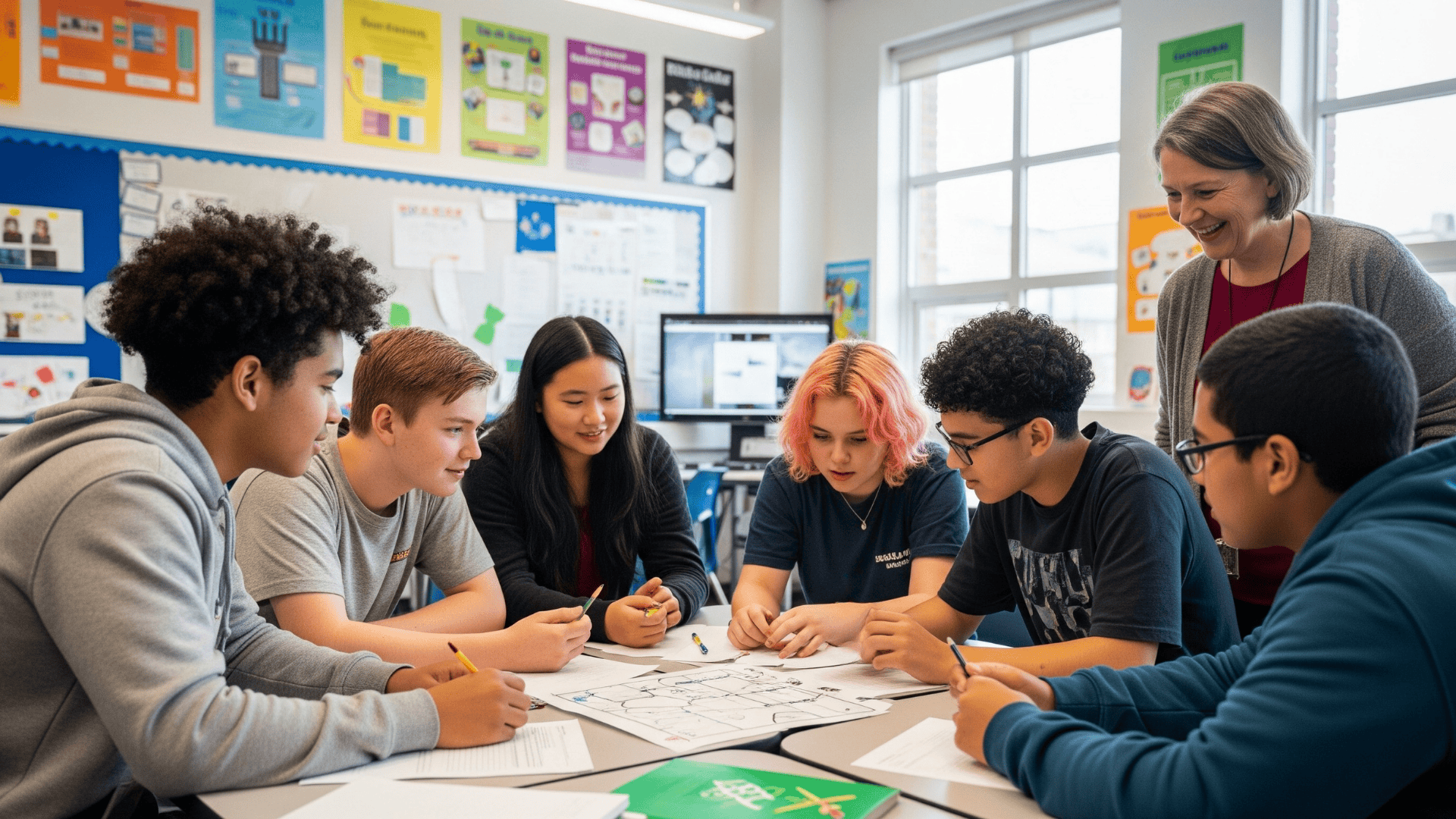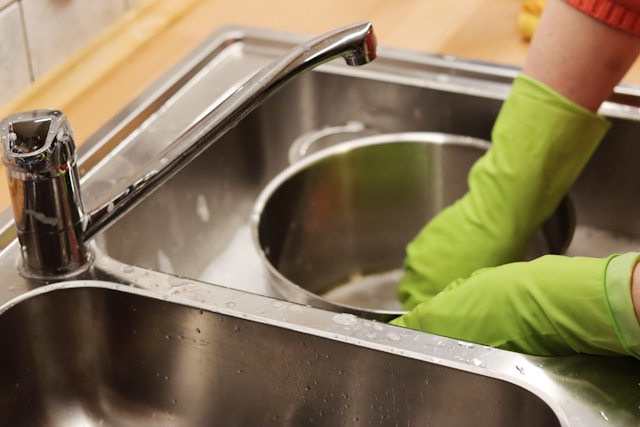Social Skills for Teens: Programs for Confidence & Friendship

Every parent watches their teenager face the complex world of friendships, school interactions, and social situations.
Some teens naturally develop strong communication abilities and build meaningful connections. Others struggle with social interactions, feeling anxious or unsure about how to connect with peers.
The teenage years bring unique social challenges that can affect academic performance, emotional well-being, and future relationships.
These specialized classes offer teenagers the tools they need to build lasting friendships and handle social situations with greater ease.
This guide provides parents with essential information about available programs, what teens learn in these classes, and how to choose the right program for their family’s needs.
What are Social Skills and Why are They Important for Teens?
Social skills include a wide range of abilities that help people interact effectively with others. These include clear communication, active listening, understanding emotions, working well in teams, and resolving conflicts peacefully.
For teenagers, these skills form the foundation for healthy relationships and personal growth. Strong social abilities support teens in multiple areas of their lives.
In school, students who communicate well often participate more actively in class discussions and work better in group projects.
These same skills help teens build genuine friendships based on mutual respect and understanding. Today’s teenagers face unique social challenges that previous generations didn’t encounter.
Types of Social Skills Programs for Teens

Parents can choose from several different types of programs to help their teenagers develop stronger social abilities.
Each approach offers unique benefits and is more effective for different learning styles and comfort levels.
1. Evidence-Based Group Programs
Several research-backed programs help teenagers develop social competencies effectively.
The PEERS® Program offers a 14-16 week curriculum for teens facing social challenges. This program teaches making friends, reading social cues, and handling real-life situations.
Skillstreaming the Adolescent provides another evidence-based approach with 50 structured lessons divided into six categories.
The Prepare Curriculum offers comprehensive coverage with 10 courses containing 93 different activities that address various social scenarios teens commonly encounter.
2. Online and Local Social Skills Classes
Many communities now offer in-person and virtual group classes led by trained clinicians or educators.
These classes often adapt methods from research-based programs to fit local needs and schedules. Teens learn practical skills like starting conversations, respecting boundaries, and handling difficult social situations.
Virtual options have made these programs more accessible to families in rural areas or those with transportation challenges.
Online classes maintain the benefits of group interaction while offering greater scheduling flexibility.
3. Social Skills Activities and Clubs
Some teens benefit from less formal approaches that build social skills through engaging activities. Debate clubs help teenagers learn to express their opinions respectfully while listening to different viewpoints.
Team problem-solving challenges teach cooperation and communication under pressure. Parents can look for local community centers, schools, or youth organizations that offer these types of programs.
Drama clubs, volunteer groups, and recreational sports teams also provide excellent opportunities for social skill development.
4. Individual Coaching and Counseling
Some teenagers benefit more from one-on-one support, especially those who feel too anxious in group settings.
Individual coaching allows for personalized attention to specific challenges like social anxiety or conflict resolution skills.
This approach works particularly well for teens who need time to build confidence before joining group activities. Individual sessions can address underlying issues that might interfere with social skill development.
What Teens Learn in Social Skills Programs

Social skills programs typically cover several key areas that teenagers encounter in their daily lives.
- Conversation Skills – Teens learn how to start conversations naturally, maintain engaging discussions, and end conversations appropriately through role-playing exercises and guided practice sessions.
- Empathy and Perspective-Taking – Through emotion identification games and peer feedback activities, teenagers learn to recognize social cues and understand how their words and actions affect others.
- Teamwork and Cooperation – Group challenges and collaborative activities teach teens how to contribute their ideas while respecting others’ input and working effectively toward common goals.
- Conflict Resolution – Scripted scenarios and guided practice help teenagers learn to express their needs clearly, listen to different perspectives, and find mutually acceptable solutions to disagreements.
- Friendship Building – Programs teach practical skills like planning social activities, being supportive during difficult times, and reading social situations accurately to develop meaningful relationships.
- Self-Confidence Building – Through successful social experiences and positive feedback from peers and instructors, teens gradually develop greater comfort and assurance in social situations.
These structured learning experiences help teens develop practical abilities they can use in school, friendships, and future relationships.
What Makes a Social Skills Program the Best
The most effective social skills programs share several important characteristics that parents should look for when choosing options for their teenagers.
Evidence-based curricula with documented results provide confidence that the program has helped other teens achieve measurable improvements.
Small group sizes of 6-8 participants ensure individual attention and adequate practice opportunities.
Parent involvement components help families support progress at home, while homework assignments encourage real-life skill application. A safe, supportive environment allows teens to take risks without judgment.
Flexible scheduling accommodates busy teen schedules with after-school, evening, or weekend options to meet different family needs.
How to Choose the Right Social Skills Program

Selecting the best program for a specific teenager requires careful consideration of individual needs and circumstances. Here are the key factors parents should evaluate when making this important decision.
- Assess your teen’s specific needs – Consider if they struggle with conversation skills, social anxiety, making friends, or conflict resolution to find the most appropriate program focus.
- Consider the program format – Decide between group versus individual sessions and in-person versus online options based on your teen’s comfort level and learning preferences.
- Check facilitator qualifications – Look for programs led by licensed mental health professionals, certified social skills instructors, or educators with specialized training in adolescent development.
- Evaluate parent involvement opportunities – Choose programs that include parent coaching sessions or regular communication about progress, as family support greatly enhances effectiveness.
- Research evidence and outcomes – Ask program providers about success rates, follow-up studies, and testimonials from other families to ensure the program has documented effectiveness.
Tips for Supporting Your Teen’s Social Growth
Parents play a crucial role in reinforcing social skills learning beyond formal programs. Here are practical ways families can support their teenager’s social development at home and in the community.
| Support Strategy | How to Implement |
|---|---|
| Encourage group activities | Help your teen join clubs, sports teams, volunteer activities, or community groups |
| Practice at home | Use family games, discussions, and shared meals to practice conversation and listening skills |
| Be patient with progress | Remember that social skills develop gradually through repeated practice and experience |
| Celebrate small wins | Acknowledge when you notice your teen using new social skills or handling situations better |
| Create social opportunities | Invite friends over or host family gatherings so teens can practice in comfortable settings |
Conclusion
Social skills classes and programs offer valuable support for teenagers learning to handle the complex world of peer relationships and social interactions.
These structured learning opportunities provide teens with practical tools they can use throughout their lives to build meaningful connections and handle social challenges with confidence.
The variety of available programs means that parents can find options that match their teen’s specific needs, learning style, and comfort level.
Parents who check out these options and support their teens’ social growth help set the foundation for lifelong interpersonal success and personal fulfillment.
Have you found effective social skills programs in your area? Comment below with recommendations or questions about finding the right fit for your teen!






